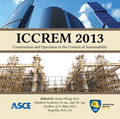A Framework for Integrated Analysis of Building Designs Using a Life-Cycle Assessment and Energy Simulation
Publication: ICCREM 2013: Construction and Operation in the Context of Sustainability
Abstract
The building and construction industry has been steadily adopting the concept of sustainable design. Consequently, the design phase of a building project has become a critical stage in determining how sustainability goals of a project will be accomplished. Life cycle assessment (LCA) is a quantitative method to determine environmental impacts of materials, products, processes or buildings. However, it is often a challenge to quantify use phase building energy consumption in life cycle assessment due to the dynamic nature of this phase. Energy consumption is an important factor in the life cycle of a building project. Much research acknowledges that buildings are responsible for a significant amount of energy consumption in the USA and in countries around the world. There is currently an increasing demand from both public and private sectors to deliver buildings that are energy efficient. A feasible set of tools in dealing with the energy efficiency analysis during design are energy simulation programs, which allow the evaluation of energy performance of different building designs and the selection of the most appropriate alternatives. This research is focused on developing a framework for integrated analysis of building designs using life cycle assessment and energy simulation by extending the existing SimulEICon. Such a framework allows tracking design parameters (such as energy consumption and costs) during the entire design phase of a project. Construction and building life cycle-related data are stored in an alternatives database which includes the probability distributions of individual parameters and the possible combinations among such parameters. Monte Carlo simulation is used to address data uncertainty and availability. The energy simulation software, Energy Plus is used in order to calculate use phase energy consumption. Genetic algorithm optimization is applied to address the issue of selecting optimal solutions from a large number of possible design alternatives during the decision-making process at the design phase. A case study is presented to demonstrate the feasibility and potential of the framework.
Get full access to this article
View all available purchase options and get full access to this chapter.
Information & Authors
Information
Published In
Copyright
© 2013 American Society of Civil Engineers.
History
Published online: Nov 12, 2013
Authors
Metrics & Citations
Metrics
Citations
Download citation
If you have the appropriate software installed, you can download article citation data to the citation manager of your choice. Simply select your manager software from the list below and click Download.
